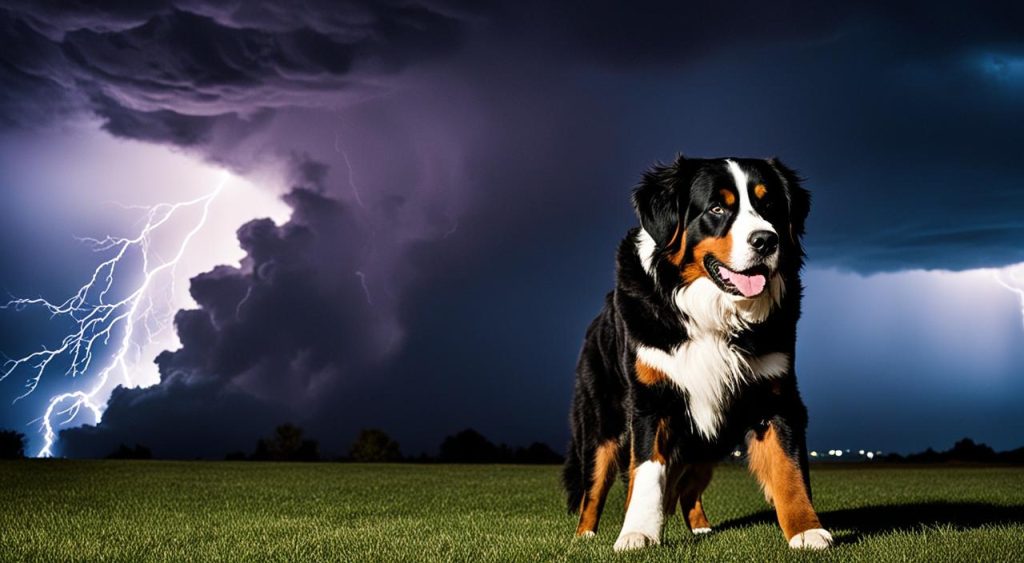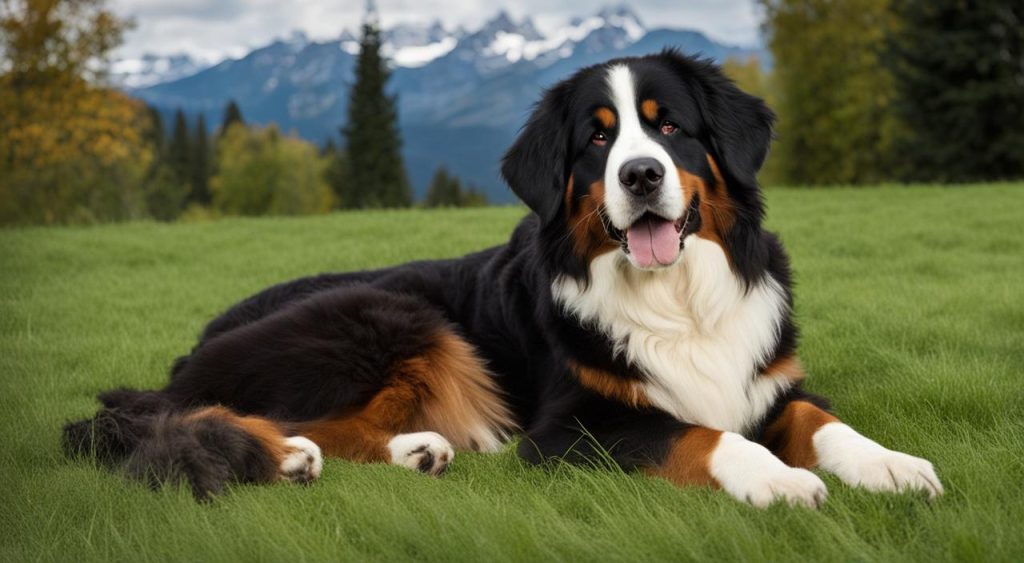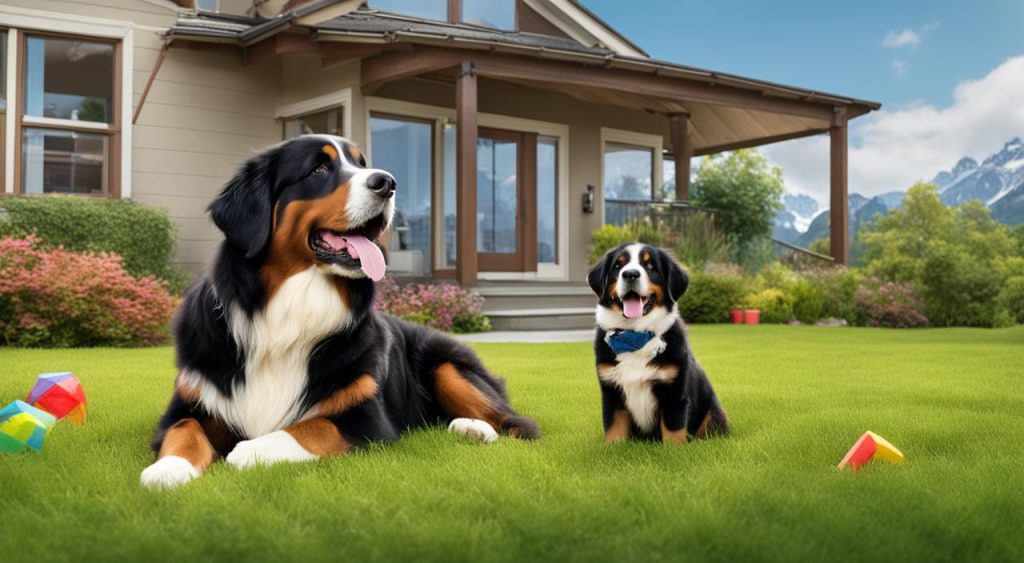Bernese Mountain Dogs are known for their gentle nature and loving temperament. However, these beautiful creatures can also experience anxiety, just like any other dog. Understanding the reasons behind their anxiety is crucial for providing them with the care and support they need.
There are several common causes of anxiety in Bernese Mountain Dogs. One of the most prevalent is separation anxiety. When left alone, these dogs may exhibit signs of anxiety, such as excessive pacing, drooling, biting, or destructive behavior. Another form of anxiety commonly seen in Bernese Mountain Dogs is sound anxiety. This refers to their fear of loud noises, such as thunderstorms, fireworks, or even the noise of a vacuum cleaner. Additionally, travel anxiety is another issue that may affect these dogs, leading to fear when traveling in vehicles or visiting intimidating places like the vet’s office or a boarding kennel.
Recognizing the signs and understanding the causes of anxiety in Bernese Mountain Dogs is the first step towards helping them overcome their fears and anxieties. By creating a supportive environment, implementing positive training techniques, and seeking professional help when necessary, you can help your Bernese Mountain Dog live a happier and more relaxed life.
Key Takeaways:
- Separation anxiety, sound anxiety, and travel anxiety are common causes of anxiety in Bernese Mountain Dogs.
- Symptoms of anxiety in Bernese Mountain Dogs include pacing, drooling, biting, and destructive behavior.
- Creating a secure environment, maintaining consistent routines, and seeking professional help can help manage anxiety in Bernese Mountain Dogs.
- Desensitization, herbal supplements, and products like Thundershirt can provide relief for anxious Bernese Mountain Dogs.
- Proper socialization and understanding the fear period are essential for reducing anxiety in Bernese Mountain Dogs.
Managing Anxiety in Bernese Mountain Dogs
Acknowledging and addressing anxiety in Bernese Mountain Dogs is crucial for their well-being. Fortunately, there are various effective strategies available to help manage and reduce anxiety in these wonderful dogs.
1. Experiment with Hemp oil: Hemp oil has shown promising results in reducing anxiety in dogs, including Bernese Mountain Dogs. Adding this natural supplement to their routine can provide relief and promote a sense of calmness.
2. Desensitization: Gradually exposing your Bernese Mountain Dog to the triggers of their anxiety can help them become more comfortable with those situations. For example, if your dog experiences anxiety during car rides, start by introducing short and calm rides and gradually increase the duration and intensity to reduce their fear.
3. Sound therapy: Sound anxiety, such as fear of thunder or fireworks, can be challenging for dogs. One approach is to isolate your dog in a smaller, soundproof room and play soothing music or white noise to drown out the loud noises that trigger their anxiety.
4. Compression wraps: Products like the Thundershirt provide gentle pressure that can help calm anxious dogs. These wraps create a swaddling effect, similar to the feeling of being held, which can alleviate anxiety in Bernese Mountain Dogs.
5. Herbal supplements: Calming herbal supplements containing ingredients like chamomile, passion flower, ginger root, or valerian root can have a soothing effect on anxious Bernese Mountain Dogs. Speak to your veterinarian for the appropriate dosage and recommendations.
6. Pheromone diffusers and supplements: Pheromone diffusers, such as Adaptil, release synthetic calming pheromones that mimic the ones produced naturally by mother dogs to soothe their puppies. Additionally, there are anti-anxiety supplements available that contain ingredients like L-Tryptophan, L-Theanine, or melatonin to help reduce anxiety.
Remember, every Bernese Mountain Dog is unique, so finding the right approach for your furry friend may require some experimentation. Monitoring their response and consulting with a veterinarian can ensure the most effective anxiety management for your beloved companion.
Understanding Anxiety in Bernese Mountain Dogs
Anxiety in Bernese Mountain Dogs can be influenced by various factors, such as genetic predisposition and lack of socialization. These factors can contribute to the development of anxiety issues, which require understanding and intervention to support the well-being of your Bernese Mountain Dog.
One important aspect to consider is the strong bond between Bernese Mountain Dogs and their owners. This bond can sometimes lead to separation anxiety when you’re away. Your dog may experience distress when separated from you, manifesting through behaviors like pacing, excessive drooling, or destructive actions. Understanding this attachment and working on gradual separations can help alleviate separation anxiety.
Socialization plays a vital role in minimizing anxiety in Bernese Mountain Dogs. By exposing them to various environments, people, and other animals from an early age, you can help them learn to navigate new situations with confidence and reduce anxiety. Providing positive experiences during socialization can contribute to their overall emotional well-being.
Proper socialization from a young age can help reduce anxiety in Bernese Mountain Dogs and set them up for a happier, more confident future.
Creating a secure environment and maintaining consistent routines can also help reduce anxiety. Dogs thrive on structure and predictability, and a stable routine can provide them with a sense of security. Ensuring a safe physical environment free of potential stressors, such as loud noises or uncomfortable confinement, is crucial.
Another essential factor to consider is the fear period during a Bernese Mountain Dog’s development. This sensitive stage occurs around 8-10 weeks of age and can influence their future temperament and reactions to certain stimuli. Providing nurturing support, positive reinforcement, and avoiding traumatic experiences during this fear period can help your dog develop into a confident and well-adjusted adult.
Always remember to provide ongoing support for your Bernese Mountain Dog. Positive reinforcement training, engaging them in activities they enjoy, and maintaining a loving and nurturing environment are key to helping them overcome anxiety issues.
Understanding these factors and taking necessary steps to address anxiety in Bernese Mountain Dogs adds to their overall quality of life. By providing a supportive and secure environment, encouraging positive experiences, and seeking guidance when needed, you can help your Bernese Mountain Dog live a happier and more relaxed life.
Conclusion
Anxiety is a common issue among Bernese Mountain Dogs, but there are effective strategies for managing it. By identifying the specific triggers and employing techniques such as desensitization and the use of calming supplements or products, you can help your Bernese Mountain Dog feel calmer and more secure.
Creating a supportive environment and maintaining consistent routines are vital in managing anxiety in Bernese Mountain Dogs. A stable and predictable environment can help alleviate their worries and provide them with a sense of security.
Seeking professional help when needed is also crucial. Veterinarians and animal behaviorists can offer valuable guidance and support in addressing separation anxiety and other forms of anxiety in Bernese Mountain Dogs. With the right tools, knowledge, and support, you can help your furry friend live a happier and more relaxed life.
Source Links
- https://iheartdogs.com/7-sure-fire-ways-to-calm-your-bernese-mountains-anxiety/
- https://www.wisconsindesignerdoodles.com/stokeshire-doodle-puppy-blog/managing-separation-anxiety-in-dogs-strategies-for-a-calmer-and-happier-bernedoodle-pup
- https://www.reddit.com/r/bernesemountaindogs/comments/13sjufl/bernese_separation_anxiety/





